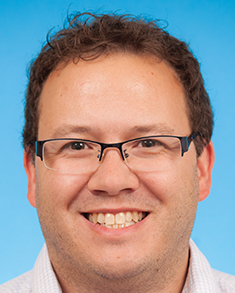Fairn recognized as ‘one of the most promising lipid researchers'
Gregory Fairn, an assistant professor at the University of Toronto and staff scientist at St. Michael’s Hospital in Toronto, won the for his discoveries in the field of lipid biology.
 “It is a great honor to be nominated for this award by colleagues and mentors who helped shape my career. Walt and Avanti Polar Lipids have been very active and supportive of lipid research over the years. I am truly humbled to receive the Walter Shaw Young Investigator Award. I’d like to thank ASBMB for the award, and the great mentors, colleagues, trainees and funding agencies for their work and support over the years.”
— GREGORY FAIRN
“It is a great honor to be nominated for this award by colleagues and mentors who helped shape my career. Walt and Avanti Polar Lipids have been very active and supportive of lipid research over the years. I am truly humbled to receive the Walter Shaw Young Investigator Award. I’d like to thank ASBMB for the award, and the great mentors, colleagues, trainees and funding agencies for their work and support over the years.”
— GREGORY FAIRN
In his letter supporting Fairn’s nomination for the award, at Dalhousie University said, “Greg Fairn has developed from one of the very best graduate students I have encountered to one of the most promising lipid researchers. He is rapidly becoming a leader in the lipid-research field not only through his scientific excellence and creativity but also by virtue of his positive attitude, collegiality and work ethic.”
Fairn’s career began in the lab of at Dalhousie University, where he investigated the regulation of lipid metabolism and vesicular transport in the trans-Golgi using yeast genetics. According to McMaster, who nominated Fairn for this award, Fairn “made a major breakthrough in our understanding of how cells target lipids and proteins to organelles within the cell.” During his graduate studies, he published 11 papers, six of them as first author.
Continuing his work in the field of lipid biochemistry during his postdoctoral studies, Fairn examined negatively charged lipids and “uncovered a critical role of these lipids in the regulation of cell polarization, phagocytosis and macropinocytosis,” said at the University of Calgary, who supported Fairn’s nomination for this award. During this time, Fairn became proficient in conducting studies of lipid biology in mammalian cells using biophysical techniques in the laboratory of from the Hospital for Sick Children and the University of Toronto. Grinstein also supported Fairn’s nomination for the award. “While he learned virtually all we have to offer, I think we learned even more from him,” said Grinstein in his letter of support.
In his own laboratory at the University of Toronto since 2012, Fairn continues to “lead the lipid field with his pioneering discoveries on the interdependence of phosphatidylserine and cholesterol intracellular distribution and movement,” according to Zaremberg. His laboratory recently generated a fluorescent cholesterol sensor suitable for live-cell imaging and electron microscopy. The biosensor has “enormous potential and will surely become a widely used tool in the near future,” said Grinstein.
Fairn also has earned numerous awards attesting to his contributions to the field of lipid biochemistry, such as the Exceptional Trainee Award from the Hospital for Sick Children, a New Investigator Award from the Canadian Institutes for Health Research and an Early Research Award from the province of Ontario.
Fairn will receive his award during the 2017 ASBMB Annual Meeting in Chicago, where he will deliver an award lecture. The presentation will take place at 11:40 a.m. April 23 in room W183c in McCormick Place.
Enjoy reading ASBMB Today?
Become a member to receive the print edition four times a year and the digital edition weekly.
Learn moreGet the latest from ASBMB Today
Enter your email address, and we’ll send you a weekly email with recent articles, interviews and more.
Latest in People
People highlights or most popular articles

Transforming learning through innovation and collaboration
Neena Grover will receive the William C. Rose Award for Exemplary Contributions to Education at the 2025 ASBMB Annual Meeting, April 12–15 in Chicago.

Guiding grocery carts to shape healthy habits
Robert “Nate” Helsley will receive the Walter A. Shaw Young Investigator in Lipid Research Award at the 2025 ASBMB Annual Meeting, April 12–15 in Chicago.

Leading the charge for gender equity
Nicole Woitowich will receive the ASBMB Emerging Leadership Award at the 2025 ASBMB Annual meeting, April 12–15 in Chicago.

Honors for de la Fuente, Mittag and De La Cruz
César de la Fuente receives the American Society of Microbiology’s Award for Early Career Basic Research. Tanja Mittag and Enrique M. De La Cruz are named fellows by the Biophysical Society.

In memoriam: Horst Schulz
He was a professor emeritus at City College of New York and at the CUNY Graduate Center in Manhattan whose work concentrated on increasing our understanding of mitochondrial fatty acid metabolism and an ASBMB member since 1971.

Computational and biophysical approaches to disordered proteins
Rohit Pappu will receive the 2025 DeLano Award for Computational Biosciences at the ASBMB Annual Meeting, April 12-15 in Chicago.

